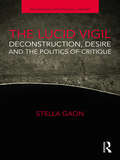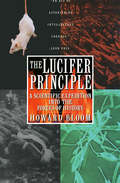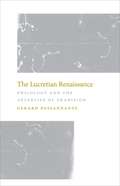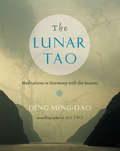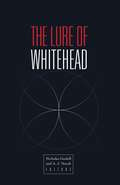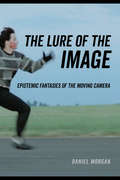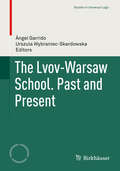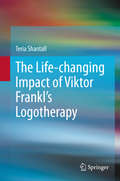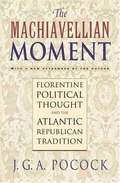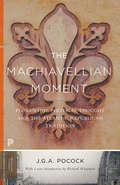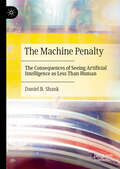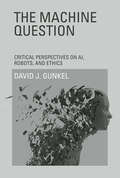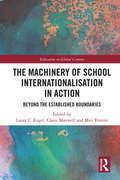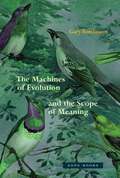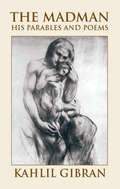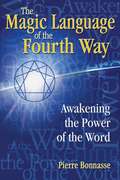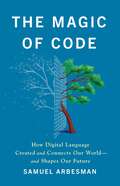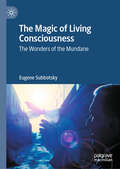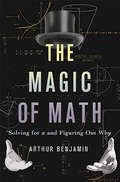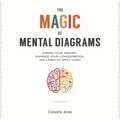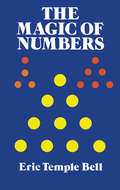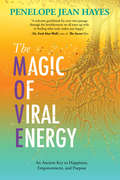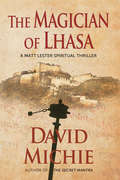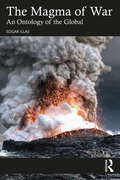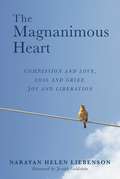- Table View
- List View
The Lucid Vigil: Deconstruction, Desire and the Politics of Critique (Psychoanalytic Political Theory)
by Stella GaonStella Gaon provides the first fully philosophical account of the critical nature of deconstruction, and she does so by turning in an original way to psychoanalysis. Drawing on close readings of Freud and Laplanche, Gaon argues that Derridean deconstruction is driven by a normative investment in reason’s psychological force. Indeed, deconstruction is more faithful to the principle of reason than the various forms of critical theory prevalent today. For if one pursues the classical demand for rational grounds vigilantly, one finds that claims to ethical or political legitimacy cannot be rationally justified, because they are undone by logical undecidability. Gaon’s argument is borne out in the cases of Kantian deontology, Deweyan pragmatism, progressive pedagogy, Habermasian moral theory, Levinasian ethics and others. What emerges is the groundbreaking demonstration that deconstruction is impelled by a quasi-ethical critical drive, and that to read deconstructively is to radicalize the emancipatory practice of reason as self-critique. This important volume will be of great value to critical theorists as well as to Derrida scholars and researchers in social and political thought.
The Lucifer Principle: A Scientific Expedition into the Forces of History
by Howard BloomThe Lucifer Priciple is a revolutionary work that explores the intricate relationships among genetics, human behavior, and culture to put forth the thesis that "evil” is a by-product of nature’s strategies for creation and that it is woven into our most basic biological fabric.In a sweeping narrative that moves lucidly among sophisticated scientific disciplines and covers the entire span of the earth’s, as well as mankind’s, history, Howard Bloom challenges some of our most popular scientific assumptions. Drawing on evidence from studies of the most primitive organisms to those on ants, apes, and humankind, the author makes a persuasive case that it is the group, or "superorganism,” rather than the lone individual that really matters in the evolutionary struggle. But, Bloom asserts, the prominence of society and culture does not necessarily mitigate against our most violent, aggressive instincts. In fact, under the right circumstances the mentality of the group will only amplify our most primitive and deadly urges.In Bloom’s most daring contention he draws an analogy between the biological material whose primordial multiplication began life on earth and the ideas, or "memes,” that define, give cohesion to, and justify human superorganisms. Some of the most familiar memes are utopian in nature-Christianity or Marxism; nonetheless, these are fueled by the biological impulse to climb to the top of the heirarchy. With the meme’s insatiable hunger to enlarge itself, we have a precise prescription for war.Biology is not destiny; but human culture is not always the buffer to our most primitive instincts we would like to think it is. In these complex threads of thought lies the Lucifer Principle, and only through understanding its mandates will we able to avoid the nuclear crusades that await us in the twenty-first century.
The Lucretian Renaissance: Philology and the Afterlife of Tradition
by Gerard PassannanteWith The Lucretian Renaissance, Gerard Passannante offers a radical rethinking of a familiar narrative: the rise of materialism in early modern Europe. Passannante begins by taking up the ancient philosophical notion that the world is composed of two fundamental opposites: atoms, as the philosopher Epicurus theorized, intrinsically unchangeable and moving about the void; and the void itself, or nothingness. Passannante considers the fact that this strain of ancient Greek philosophy survived and was transmitted to the Renaissance primarily by means of a poem that had seemingly been lost--a poem insisting that the letters of the alphabet are like the atoms that make up the universe. By tracing this elemental analogy through the fortunes of Lucretius's On the Nature of Things, Passannante argues that, long before it took on its familiar shape during the Scientific Revolution, the philosophy of atoms and the void reemerged in the Renaissance as a story about reading and letters--a story that materialized in texts, in their physical recomposition, and in their scattering. From the works of Virgil and Macrobius to those of Petrarch, Poliziano, Lambin, Montaigne, Bacon, Spenser, Gassendi, Henry More, and Newton, The Lucretian Renaissance recovers a forgotten history of materialism in humanist thought and scholarly practice and asks us to reconsider one of the most enduring questions of the period: what does it mean for a text, a poem, and philosophy to be "reborn"?
The Lunar Tao
by Deng Ming-DaoWe all live our lives by the Sun and the Moon The lunar calendar is a main pillar of Chinese tradition and culture, encompassing many festivals and stories. Though most explorations of Taoism take place within the realm of scripture, exercises, and formal lectures, Deng Ming-Dao looks to the lunar calendar and highlights where these festivals and stories coincide with Taoism, giving readers a renewed and original way into this ancient philosophy. Each day of the lunar year is represented with a reading meditation, original translations, illustrations, and illuminating facts about festivals and traditions, providing readers with the context that gives Taoism such depth and resonance. Unlike any other book, and beautifully illustrated with more than 400 photo-graphs and drawings, The Lunar Tao offers a new way to explore Taoism and shows readers how to include the tenets of Taoism in daily life.
The Lure of Whitehead
by Nicholas Gaskill A. J. NocekOnce largely ignored, the speculative philosophy of Alfred North Whitehead has assumed a new prominence in contemporary theory across the humanities and social sciences. Philosophers and artists, literary critics and social theorists, anthropologists and computer scientists have all embraced Whitehead&’s thought, extending it through inquiries into the nature of life, the problem of consciousness, and the ontology of objects, as well as into experiments in education and digital media.The Lure of Whitehead offers readers not only a comprehensive introduction to Whitehead&’s philosophy but also a demonstration of how his work advances our emerging understanding of life in the posthuman epoch. Contributors: Jeffrey A. Bell, Southeastern Louisiana U; Nathan Brown, U of California, Davis; Peter Canning; Didier Debaise, Free U of Brussels; Roland Faber, Claremont Lincoln U; Michael Halewood, U of Essex; Graham Harman, American U in Cairo; Bruno Latour, Sciences Po Paris; Erin Manning, Concordia U, Montreal; Steven Meyer, Washington U; Luciana Parisi, U of London; Keith Robinson, U of Arkansas at Little Rock; Isabelle Stengers, Free U of Brussels; James Williams, U of Dundee.
The Lure of the Image: Epistemic Fantasies of the Moving Camera
by Daniel MorganThe Lure of the Image shows how a close study of camera movement challenges key assumptions underlying a wide range of debates within cinema and media studies. Highlighting the shifting intersection of point of view and camera position, Daniel Morgan draws on a range of theoretical arguments and detailed analyses across cinemas to reimagine the relation between spectator and camera—and between camera and film world. With sustained accounts of how the camera moves in films by Fritz Lang, Guru Dutt, Max Ophuls, and Terrence Malick and in contemporary digital technologies, The Lure of the Image exposes the persistent fantasy that we move with the camera within the world of the film and examines the ways that filmmakers have exploited this fantasy. In so doing, Morgan provides a more flexible account of camera movement, one that enables a fuller understanding of the political and ethical stakes entailed by this key component of cinematic style.
The Lvov-Warsaw School. Past and Present (Studies in Universal Logic)
by Ángel Garrido Urszula Wybraniec-SkardowskaThis is a collection of new investigations and discoveries on the history of a great tradition, the Lvov-Warsaw School of logic and mathematics, by the best specialists from all over the world. The papers range from historical considerations to new philosophical, logical and mathematical developments of this impressive School, including applications to Computer Science, Mathematics, Metalogic, Scientific and Analytic Philosophy, Theory of Models and Linguistics.
The Lıfe-changıng Impact of Vıktor Frankl's Logotherapy
by Teria ShantallThis book provides an in-depth analysis of of the logotherapy of Viktor Frankl and delves into the spiritual depths of an inherent search for meaning in life. Written by a highly experienced and competent logotherapist trained by Frankl himself, this book is excitingly new and unique in that it takes the reader, in the role of a client accompanied by the author in the role of the therapist, through the unfolding phase-by-phase process of logotherapy. Logotherapy is explored as a depth and as a height psychology. From a provoked will to meaning out of the depths of a spiritual unconscious, the author takes the search for meaning to the ultimate heights in the achievement of human greatness. This book brings Frankl’s own profound life’s orientation back to life and, in its reader-friendly style, has the freshness of Frankl’s own way of writing. It is written in a refreshingly simple and straightforward style for easy accessibility to a wide readership. It includes cases studies and exercises for readers and is meant for use in logotherapy courses worldwide. Additionally, it will appeal to laypersons seeking a deeper meaning to their lives, psychology students and mental health professionals alike.
The Machiavellian Moment: Florentine Political Thought and the Atlantic Republican Tradition
by J. G. A. PocockThis book is a classic study of the consequences for modern historical and social consciousness of the ideal of the classical republic revived by Machiavelli and other thinkers of Renaissance Italy.
The Machiavellian Moment: Florentine Political Thought and the Atlantic Republican Tradition
by J. G. Pocock Richard WhatmoreOriginally published in 1975, The Machiavellian Moment remains a landmark of historical and political thought. Celebrated historian J.G.A. Pocock looks at the consequences for modern historical and social consciousness arising from the ideal of the classical republic revived by Machiavelli and other thinkers of Renaissance Italy. Pocock shows that Machiavelli's prime emphasis was on the moment in which the republic confronts the problem of its own instability in time, which Pocock calls the "Machiavellian moment."After examining this problem in the works of Machiavelli, Guicciardini, and Giannotti, Pocock turns to the revival of republican ideology in Puritan England and in Revolutionary and Federalist America. He argues that the American Revolution can be considered the last great act of civic humanism of the Renaissance and he relates the origins of modern historicism to the clash between civic, Christian, and commercial values in eighteenth-century thought.This Princeton Classics edition of The Machiavellian Moment features a new introduction by Richard Whatmore.
The Machine Penalty: The Consequences of Seeing Artificial Intelligence as Less Than Human
by Daniel B. ShankThis book makes the argument that comparing AI to humans leads us to diminish similar outcomes from AI across situations. This may be taking a human&’s advice for a restaurant recommendation over an AI&’s or believing that AI can&’t be as biased as people can when denying loans to others. This machine penalty is caused both by comparing humans and AI in terms of appearance, identity, behavior, mind, and essence, and by situations involving controllable, personal, important, subjective, or moral decisions. It can be applied across many different situations, where we diminish different AI outcomes. We penalize machines&’ influence when they give advice, fairness when they evaluate people, blame when they cause harm, value when they produce art, and satisfaction when they provide companionship. The result is immediate consequences in those domains and downstream consequences for society. This monograph brings together diverse research from human-computer interaction, psychology, sociology, and communication including theories such as Computers Are Social Actors, anthropomorphism, mind perception, and algorithm aversion to present an expansive argument and evidence for the machine penalty.
The Machine Question: Critical Perspectives on AI, Robots, and Ethics (The\mit Press Ser.)
by David J. GunkelAn investigation into the assignment of moral responsibilities and rights to intelligent and autonomous machines of our own making.One of the enduring concerns of moral philosophy is deciding who or what is deserving of ethical consideration. Much recent attention has been devoted to the "animal question"—consideration of the moral status of nonhuman animals. In this book, David Gunkel takes up the "machine question": whether and to what extent intelligent and autonomous machines of our own making can be considered to have legitimate moral responsibilities and any legitimate claim to moral consideration.The machine question poses a fundamental challenge to moral thinking, questioning the traditional philosophical conceptualization of technology as a tool or instrument to be used by human agents. Gunkel begins by addressing the question of machine moral agency: whether a machine might be considered a legitimate moral agent that could be held responsible for decisions and actions. He then approaches the machine question from the other side, considering whether a machine might be a moral patient due legitimate moral consideration. Finally, Gunkel considers some recent innovations in moral philosophy and critical theory that complicate the machine question, deconstructing the binary agent–patient opposition itself.Technological advances may prompt us to wonder if the science fiction of computers and robots whose actions affect their human companions (think of HAL in 2001: A Space Odyssey) could become science fact. Gunkel's argument promises to influence future considerations of ethics, ourselves, and the other entities who inhabit this world.
The Machinery of School Internationalisation in Action: Beyond the Established Boundaries (Education in Global Context)
by Claire Maxwell Laura Engel Miri YeminiDrawing on scholarship from the field of internationalisation in higher education and other theoretical influences in education policy, comparative education and sociology of education, this edited collection offers a much-needed extension of discussion and research into the compulsory schooling context. In this book, established and emerging scholars provide an authoritative set of conceptual tools for researchers in the field of internationalisation of compulsory schooling. It provides an overview of the current knowledge base and ways in which future research could engage with gaps in understandings. Through detailed case studies of the multiple forms of internationalisation present within schools and schooling systems, the volume considers why and how processes of internationalisation are shaping compulsory schooling today. This book will offer scholars and educators a clearer, more coherent set of conceptual frameworks within which to position their work in sociology of education, and international and comparative education, helping to develop a more comprehensive understanding of the many ways compulsory schooling is being internationalised, and with what consequences.
The Machines of Evolution and the Scope of Meaning
by Gary TomlinsonA groundbreaking account of the origin and place of meaning in the earthly biosphereWhat is meaning? How does it arise? Where is it found in the world? In recent years, philosophers and scientists have answered these questions in different ways. Some see meaning as a uniquely human achievement, others extend it to trees, microbes, and even to the bonding of DNA and RNA molecules. In this groundbreaking book, Gary Tomlinson defines a middle path. Combining emergent thinking about evolution, new research on animal behaviors, and theories of information and signs, he tracks meaning far out into the animal world. At the same time he discerns limits to its scope and identifies innumerable life forms, including many animals and all other organisms, that make no meanings at all.Tomlinson’s map of meaning starts from signs, the fundamental units of reference or aboutness. Where signs are at work they shape meaning-laden lifeways, offering possibilities for distinctive organism/niche interactions and sometimes leading to technology and culture. The emergence of meaning does not, however, monopolize complexity in the living world. Countless organisms generate awe-inspiring behavioral intricacies without meaning. The Machines of Evolution and the Scope of Meaning offers a revaluation of both meaning and meaninglessness, uncovering a foundational difference in animal solutions to the hard problem of life.
The Madman: His Parables and Poems
by Kahlil GibranWidely known in America as author of The Prophet, which sold more copies in the 20th century than any other book but the Bible, the great Lebanese-American poet and artist Kahlil Gibran (1883–1931) first became known to Americans in 1918 with the publication of The Madman.Thought-provoking and inspiring, the book is a collection of memorable, life-affirming parables and poems, many of them casting an ironic light on the beliefs, aspirations, and vanities of humankind — and many reminiscent of the work of Tagore and Nietzsche, both of whom were strong influences on Gibran.Among the 35 poems and parables in this volume are "How I Became a Madman," "The Two Hermits," "The Wise Dog," "The Good God and the Evil God," "Night and the Madman," "The Three Ants," "When My Sorrow Was Born," "And When My Joy Was Born," and many more.The book includes several illustrations by the author, whose exquisite drawings are reminiscent of Rodin and the best of Blake. ". . . the greatest of Arab Romantics and father of a 20th-century Romantic tradition whose impact on Arab writers has been at least as strong as that of 19th-century figures such as Wordsworth and Keats on their English-speaking counterparts." — Dr. Suheil Bushrui, Director of the Kahlil Gibran Chair on Values and Peace, University of Maryland
The Magic Language of the Fourth Way: Awakening the Power of the Word
by Pierre BonnasseAn application of Gurdjieffian principles to fully and properly activate the power of language • Explains the relationship between the Gurdjieff enneagram and sacred geometry and harmonics • Shows that the objective power of language--and art and music--lies in the ability to use symbols that will mean precisely the same thing to anyone • Includes a new English translation of René Daumal’s essay “The Holy War” In The Magic Language of the Fourth Way, Pierre Bonnasse applies the esoteric teachings of Fourth Way mystic G. I. Gurdjieff and the insights of initiate René Daumal to show how to fully and properly activate the power of language. Bonnasse shows how words can regain the strange magical powers they possessed in the first days of humanity, when words created the realities of what they described. This is a far cry from today’s world in which even writers lament the impotent nature of language.Bonnasse uses the relationship between the Gurdjieff enneagram and sacred geometry and harmonics to reveal the power given to words by the notes of the scale. He shows not only how to discover the objective power of words but also how to apply the relationship between language and living to maximum effect. He explains that the objective power of language--and art and music--lies in the ability to use symbols that will mean precisely the same thing to anyone. The Magic Language of the Fourth Way serves as a clear and generous introduction to the complexities of Gurdjieffian thought as well as a descriptive how-to manual for Fourth Way aspirants on the uses of objective language for spiritual advancement.
The Magic of Code: How Digital Language Created and Connects Our World—and Shapes Our Future
by Samuel ArbesmanIn the tradition of classics such as The Lives of a Cell, a bold reframing of our relationship with technology that argues code is "a universal force—swirling through disciplines, absorbing ideas, and connecting worlds" (Linda Liukas). In the digital world, code is the essential primary building block, the equivalent of the cell or DNA in the biological sphere—and almost as mysterious. Code can create entire worlds, real and virtual; it allows us to connect instantly to people and places around the globe; and it performs tasks that were once only possible in science fiction. It is a superpower, and not just in a technical sense. It is also a gateway to ideas. As vividly illustrated by Samuel Arbesman, it is the ultimate connector, providing new insight and meaning into how everything from language and mythology to biblical texts, biology, and even our patterns of thought connect with the history and nature of computing. While the building block of code can be used for many wondrous things it can also create deeper wedges in our society and be weaponized to cause damage to our planet or our civilization. Code and computing are too important to be left to the tech community; it is essential that each of us engage with it. And we fail to understand it to our detriment. By providing us with a framework to think about coding and its effects upon the world and placing the past, current, and future developments in computing into its broader setting we see how software and computers can work for people as opposed to against our needs. With this deeper understanding into the &“why&” of coding we can be masters of technology rather than its subjects.
The Magic of Living Consciousness: The Wonders of the Mundane
by Eugene SubbotskyThis book demystifies the notion of living consciousness and aims to show that, far from being a mere accompaniment to brain functions, living consciousness defines the features of both physical objects and human artifacts. The distinction is between living consciousness, which includes subjective experiences ‘here and now’ (e.g., perceptions, feelings, imagination, and creative thinking) and conforms to the laws of magic, versus objectified consciousness that comprises physical (e.g., computers) and symbolic (e.g., languages and concepts) human artifacts and conforms to the laws of nature and formal logic.The magnificent success of science in the modern world has plunged many scientists into the illusion that magical events are ancient history and exist today only in art and night dreams. The illusion reached its pinnacle in the middle of the 20th century, when nuclear power stations, flights to the Moon, early computers, genetic engineering and other wonders of science made some scientists believe that there is nothing in the world that cannot be explained by science. But there was a price to pay for this scientific optimism – the scientists became blind to their living consciousness. They began looking at the world as if nature and objectified consciousness were the only things that mattered, with living consciousness being viewed as a mundane thing that accompanies brain processes but has no causal powers.This book examines how our living consciousness works, and how our understanding of this work helps in solving key problems of modern life, such as facilitating creativity, protecting from magical manipulation with minds, fighting certain kinds of crime, managing fake reality, preventing misuses in psychotherapy and other psychological practices, comprehending controversial issues in science, and tracing origins of totalitarian media narratives that trigger hatred and wars.
The Magic of Math: Solving for x and Figuring Out Why
by Arthur BenjaminThe Magic of Math is the math book you wish you had in school. Using a delightful assortment of examples-from ice cream scoops and poker hands to measuring mountains and making magic squares-this book empowers you to see the beauty, simplicity, and truly magical properties behind those formulas and equations that once left your head spinning. You'll learn the key ideas of classic areas of mathematics like arithmetic, algebra, geometry, trigonometry, and calculus, but you'll also have fun fooling around with Fibonacci numbers, investigating infinity, and marveling over mathematical magic tricks that will make you look like a math genius!A mathematician who is known throughout the world as the "mathemagician," Arthur Benjamin mixes mathematics and magic to make the subject fun, attractive, and easy to understand. In The Magic of Math, Benjamin does more than just teach skills: with a tip of his magic hat, he takes you on as his apprentice to teach you how to appreciate math the way he does. He motivates you to learn something new about how to solve for x, because there is real pleasure to be found in the solution to a challenging problem or in using numbers to do something useful. But what he really wants you to do is be able to figure out why, for that's where you'll find the real beauty, power, and magic of math.If you are already someone who likes math, this book will dazzle and amuse you. If you never particularly liked or understood math, Benjamin will enlighten you and-with a wave of his magic wand-turn you into a math lover.
The Magic of Mental Diagrams: Expand Your Memory, Enhance Your Concentration, and Learn to Apply Logic
by Claudio ArosWhen Einstein said we only use 10 percent of our brain, he was inviting us to explore all those capabilities that are waiting to be awakened. This book finally explains how to do just that. Mental diagrams are a simple, efficient means of activating all our potential. Upon sketching a mental diagram, we create a blueprint with shapes, colors, and figures to process information faster and to increase our ability to synthesize. This excellent, creative system of thinking allows us to obtain a joint vision of life’s daily problems in addition to strengthening all the areas in which our mind operates, like memory, concentration, logic, or intuition. In the pages of this book, you will discover: * The function of the human brain * How to create mental diagrams * Exercises to strengthen memory * Intelligence regarding personal decisions * Tests to develop intuition and creativity * Secrets of the great lecturers
The Magic of Numbers
by Eric Temple BellFrom one of the foremost interpreters for lay readers of the history and meaning of mathematics: a stimulating account of the origins of mathematical thought and the development of numerical theory. It probes the work of Pythagoras, Galileo, Berkeley, Einstein, and others, exploring how "number magic" has influenced religion, philosophy, science, and mathematics
The Magic of Viral Energy: An Ancient Key to Happiness, Empowerment, and Purpose
by Penelope Jean HayesWant to find &“your person,&” improve your wellbeing, and be successful at your passions?The Magic of Viral Energy (MOVE) offers a fun and compelling narrative told through true short stories. Its message is for seekers—those intrepids who want to squeeze the lemons of life and discover their full potential.While meditating in 2007, Penelope Jean Hayes experienced the contagious nature of energy and a phenomenon she calls &“osmotic-energy-balancing.&” Over the next decade, she intuited a system of creation involving seven levels of energy ascending from dense and heavy upward to enlightenment.She shares that each of us has an energetic-presence that flows within one of these levels and that we only have access to the energies that reside there. Except that, we have the ability to move to higher strata, accessing the light energies that create more of what we truly want.MOVE reveals provocative insights into the universe; our relationships; the energetic antidote to unhappiness and the common cold; and our need to move from power-through-force to empowerment-through-creation. The Magic of Viral Energy is eye-opening and exciting and it makes day-to-day life easier and our big dreams possible.&“The Magic of Viral Energy could not be timelier, in my opinion. MOVE helps us recognize and understand ourselves. Viral energy is food for our soul—that&’s why it&’s magical.&” —Peter Egan, actor, Downton Abbey, Unforgotten, and Ever Decreasing Circles
The Magician of Lhasa: A Matt Lester Spiritual Thriller
by David MicheWhen novice monk Tenzin Dorje is told by his lama that the Red Army is invading Tibet, his country&’s darkest moment paradoxically gives him a sense of purpose like no other. He accepts a mission to carry two ancient, secret texts across the Himalayas to safety. Half a century later, in a paradox of similarly troubling circumstances, Matt Lester is called upon to convey his own particular wisdom as a scientist, when Matt&’s nanotech project is mysteriously moved from London to a research incubator in Los Angeles.Tenzin and Matt embark on parallel adventures which have spine-chilling connections. Tenzin&’s perilous journey through the Himalayas, amid increasing physical hardship and the ever-present horror of Red Army capture, is mirrored by Matt&’s contemporary, but no less traumatic challenges, as his passionate relationship with his fiancée, Isabella, and his high flying career undergo escalating crises. It is at the moment when both Tenzin and Matt face catastrophe that their stories converge, spectacularly transforming our understanding of all that has gone before.
The Magma of War: An Ontology of the Global
by Edgar IllasWar, from the conflicts in the Middle East and Russia/Ukraine to Mexican narco-violence, from neocolonial land grabs in the Global South to racial, border, health, and climate crises all over the planet, defines the most extreme and contradictory expression of the global world. In this fascinating exploration on the history of the thinking of conflict, Edgar Illas departs from military and sociological analyses to propose a theoretical exploration of war as the ontological force that produces political orders.Magma is used as a geological metaphor to theorize the mixtures of politics and war that organize, and disorganize, global society. Divided into two parts, Illas’ study begins by surveying some of the most important thinkers of war, moving from classical antiquity to the twentieth century. Each thinker provides a different inflection in the historical evolution of the being of war. The second part turns to a theorization of the twenty-first century to claim that conflictive relations between capital, state power, political movements, and social life in globalization culminate and at the same time reiterate the paradoxes of war as an ontological event.The Magma of War is an energizing contribution to the task of rethinking politics in relation to war and an invaluable resource to all those conscious of the unstable forms of contemporary social and political life.
The Magnanimous Heart
by Narayan Helen LiebensonIn her long-awaited debut, a beloved master teacher shows us how to move from the “constant squeeze” of suffering to a direct experience of enoughness.The magnanimous heart is a heart of balance and buoyancy, of generosity and inclusivity. It allows us to approach each moment exactly as it is, in a fresh and alive way free from agendas and “shoulds,” receiving all that arises. It has the capacity to hold anything and everything, transforming even vulnerability and grief into workable assets. In writing evocative of Pema Chödrön’s, Narayan Helen Liebenson teaches us exactly how it is possible to turn the sting and anguish of loss into a path of liberation—the deep joy, peace, and happiness within our own hearts that exists beyond mere circumstances. The Magnanimous Heart shows us how to skillfully respond to painful human emotions through the art of meditative inquiry, or questioning wisely. Readers will learn how to live from a compassionate love that guides our lives and warms whatever it shines upon. With metta and compassion as companions and allies, we discover how our own magnanimous hearts can gently allow the inner knots to untie themselves.
